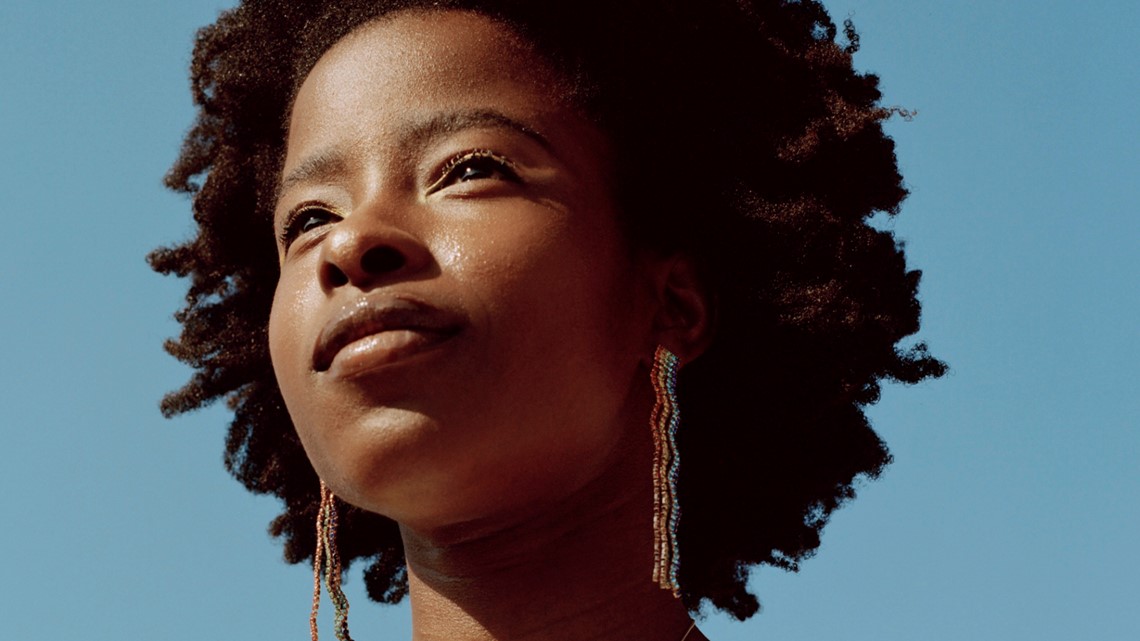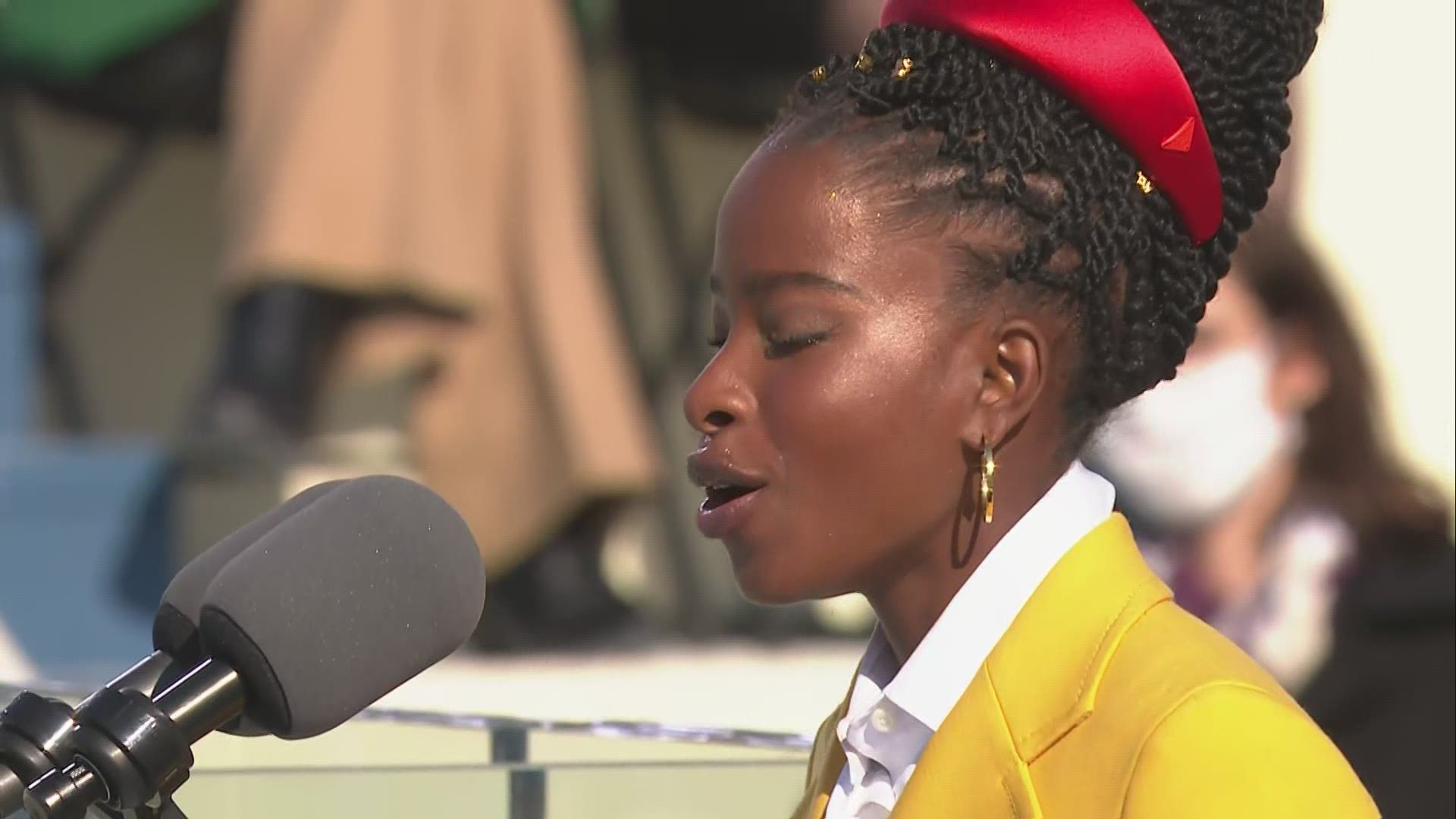NEW YORK — Inaugural poet Amanda Gorman summoned images dire and triumphant Wednesday as she called out to the world “even as we grieved, we grew."
In language referencing Biblical scripture and at times echoing the oratory of John F. Kennedy and the Rev. Martin Luther King Jr., the 22-year-old Gorman read with urgency and assertion as she began by asking “Where can we find light/In this never-ending shade?” and used her own poetry and life story as an answer. The poem's very title, “The Hill We Climb,” suggested both labor and transcendence.
"We did not feel prepared to be the heirs
Of such a terrifying hour.
But within it we’ve found the power
To author a new chapter,
To offer hope and laughter to ourselves."
It was an extraordinary task for Gorman, the youngest by far of the poets who have read at presidential inaugurations since Kennedy invited Robert Frost in 1961, with other predecessors including Maya Angelou and Elizabeth Alexander.
A native and resident of Los Angeles and the country's first National Youth Poet Laureate, Gorman told The Associated Press last week that she planned to combine a message of hope at President Joe Biden and Vice President Kamala Harris' inaugural, without ignoring "the evidence of discord and division." She had completed a little more than half of “The Hill We Climb” before Jan. 6 and the siege of the U.S. Capitol by supporters of then-President Donald Trump.
“That day gave me a second wave of energy to finish the poem,” Gorman told the AP. She had said that she would not mention Jan. 6 specifically, but her reference was unmistakable:
"We’ve seen a force that would shatter our nation rather than share it,
Would destroy our country if it meant delaying democracy.
And this effort very nearly succeeded.
But while democracy can be periodically delayed,
It can never be permanently defeated."
Frost's appearance at the Kennedy inaugural was a kind of valedictory — he was 86 and died two years later. Gorman's career is just beginning. Her first two books come out later this year — the picture story “Change Things” and a bound edition of her inaugural poem. Ceremonial works are often quickly forgotten, but Angelou's “On the Pulse Of the Morning,” which she read at the 1993 inaugural of President Bill Clinton, went on to sell more than 1 million copies as a book.
Invited to the inaugural late last month by first lady Jill Biden, Gorman has read at official occasions before — including a July 4 celebration when she was backed by the Boston Pops Orchestra. She has also made clear her desire to appear at a future inaugural, in a much greater capacity, an ambition she stated firmly in her poem.
"We, the successors of a country and a time,
Where a skinny black girl,
Descended from slaves and raised by a single mother,
Can dream of becoming president,
Only to find herself reciting for one."
The celebrated poet's piece also noted that, “while democracy can be permanently delayed, it can never be permanently denied.”
"Being American is more than a pride we inherit," Gorman read. "It's the past we step into and how we repair it."
Gorman, chosen to read at Inauguration Day in front of the Capitol, already has a history of writing for official occasions.
"I have kind of stumbled upon this genre. It's been something I find a lot of emotional reward in, writing something I can make people feel touched by, even if it's just for a night," says Gorman.
She also wrote for the inauguration at Harvard University, her alma mater, of school president Larry Bacow.
In the tradition for Democratic presidents, recent readers include poets Alexander and Richard Blanco, both of whom Gorman has been in touch with.
“The three of us are together in mind, body and spirit,” she says.


Gorman is the youngest inaugural poet in memory, and she has made news before. In 2014, she was named the first Youth Poet Laureate of Los Angeles, and three years later she became the country's first National Youth Poet Laureate. She has appeared on MTV; written a tribute to Black athletes for Nike; published her first book, “The One for Whom Food Is Not Enough,” as a teenager, and has a two-book deal with Viking Children's Books. The first work, the picture book "Change Sings," comes out later this year.
NPR reports that like Biden, who's spoken openly about having stuttered as a child, Gorman has had to overcome a childhood speech impediment too. She had difficulty saying certain letters, and R was especially tough. She said it caused her to have to constantly "self-edit and self-police."
"I'd want to say 'girls can change the world,' but I cannot say so many letters in that statement, so I'd say things like 'young women can shape the globe.'"
Gorman says she was contacted late last month by the Biden inaugural committee. She has known numerous public figures, including former Secretary of State Hillary Rodham Clinton and former first lady Michelle Obama, but says she will be meeting the Bidens for the first time. The Bidens, apparently, have been aware of her: Gorman says the inaugural officials told her she had been recommended by the incoming first lady.
Gorman says she was not given specific instructions on what to write, but was encouraged to emphasize unity and hope over “denigrating anyone” or declaring "ding, dong, the witch is dead" over Trump's departure.


The siege two weeks ago of the U.S. Capitol by Trump supporters seeking to overturn the election was a challenge for keeping a positive tone, but also an inspiration. Gorman says that she had been given five minutes to read, and before what she described during an interview as “the Confederate insurrection” of Jan. 6 she had only written about a few minutes worth.
The final length runs to about six minutes.
“That day gave me a second wave of energy to finish the poem,” says Gorman, adding that she will not refer directly to Jan. 6, but will "touch" upon it. She said last week's events did not upend the poem she had been working on because they didn't surprise her.
"The poem isn't blind," she says. "It isn't turning your back to the evidence of discord and division."
In other writings, Gorman has honored her ancestors, acknowledged and reveled in her own vulnerability ("Glorious in my fragmentation," she has written) and confronted social issues. Her poem “In This Place (An American Lyric),” written for the 2017 inaugural reading of U.S. Poet Laureate Tracy K. Smith, condemns the racist march in Charlottesville, Virginia (“tiki torches string a ring of flame”) and holds up her art form as a force for democracy:
____
Tyrants fear the poet.
Now that we know it
we can’t blow it.
We owe it
to show it
not slow it
_____
Gorman has rare status as a poet, and has dreams of other ceremonies. She would love to read at the 2028 Olympics, scheduled to be held in Los Angeles, and in 2037 wouldn't mind finding herself in an even more special position at the presidential inauguration — as the new chief executive.
“I'm going to tell Biden that I'll be back,” she said with a laugh.

